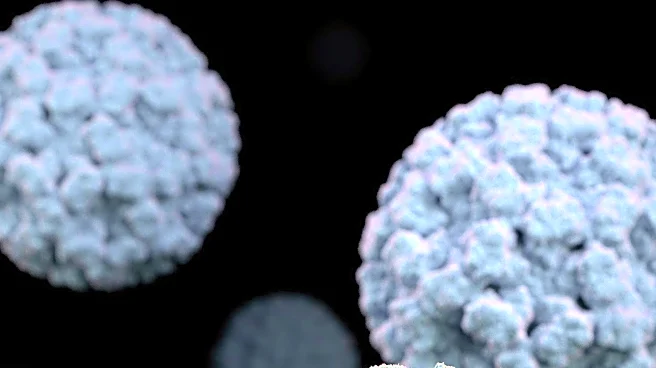What's Happening?
Recent research has focused on isolating and characterizing bacteriophages that target Stenotrophomonas maltophilia, a pathogen known for its resistance to conventional antibiotics. The study involved isolating four strains of S. maltophilia from patients and testing their susceptibility to various antibiotics. Researchers successfully isolated 34 phages from sewage samples, which showed varying infectivity patterns against the clinical isolates. Among these, phages Yut1, Yut2, and Yut4 demonstrated significant bactericidal activity in liquid cultures, with Yut2 showing particularly strong effects even at low multiplicities of infection. Genomic analysis confirmed these phages as lytic, lacking genes for integration or antimicrobial resistance, making them promising candidates for phage therapy.
Why It's Important?
The emergence of antibiotic-resistant strains of S. maltophilia poses a significant challenge to public health, particularly in hospital settings. The identification of effective bacteriophages offers a potential alternative to antibiotics, which could be crucial in treating infections resistant to current medications. This research highlights the importance of phage therapy as a viable solution to combat antibiotic resistance, potentially reducing the reliance on last-line antibiotics and mitigating the spread of resistant strains. The study's findings could lead to advancements in phage therapy applications, offering new hope for patients with difficult-to-treat infections.
What's Next?
Further research is needed to explore the therapeutic potential of these phages in clinical settings. The study suggests investigating the resistance mechanisms of S. maltophilia to enhance phage efficacy and prevent the emergence of resistant bacterial strains. Clinical trials may be necessary to validate the safety and effectiveness of phage therapy in humans. Additionally, the development of phage cocktails targeting multiple strains could improve treatment outcomes and broaden the scope of phage therapy applications.
Beyond the Headlines
The use of bacteriophages in medicine raises ethical and regulatory considerations, particularly regarding their deployment in human treatments. Ensuring phages do not carry virulence factors or contribute to bacterial evolution is crucial. The study's focus on lytic phages addresses these concerns, but ongoing monitoring and regulation will be essential as phage therapy becomes more widespread. This research also underscores the need for global collaboration in addressing antibiotic resistance, as phage therapy could play a pivotal role in future healthcare strategies.










